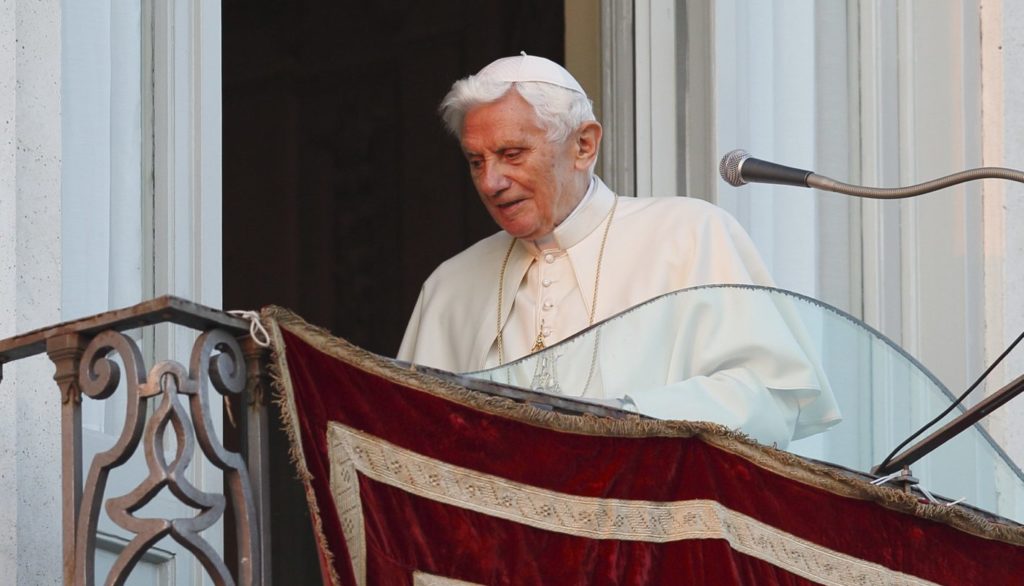 Benedict XVI expresses sorrow but rejects all accusations
Benedict XVI expresses sorrow but rejects all accusations With Benedict XVI, a pioneer in the fight against abuse is pilloried
With Benedict XVI, a pioneer in the fight against abuse is pilloriedAfter the January 20 presentation of the report on sexual abuse in the Munich diocese, what Bishop Georg Gänswein called a smear campaign against Benedict XVI was launched by various media. At the heart of the accusations against the Pope emeritus was a simple question: when asked by the law firm WSW, author of the above-mentioned report, whether he had been present at a certain meeting in January 1980, Benedict replied that he had not, when there was evidence that he had. Although on February 8 the Pope emeritus wrote a letter apologizing for what had been a transcription error - a report by four of Benedict's collaborators explained in detail how the lapse had occurred - accusations were raised in Germany that he had lied, and even that, in his time as archbishop of Munich, between 1977 and 1982, he had covered up for priests accused of committing sexual abuse.
Now, the Swiss theologian Martin Rhonheimer -former professor of Ethics and Political Philosophy at the Pontifical University of the Holy Cross (Rome) and co-founder and current president of the Austrian Institute of Economics and Social Philosophy in Vienna, where he resides- has just published an accurate analysis in the German newspaper "Die Welt". He affirms that, if the Pope Emeritus "continues to be the target of criticism today", it is "because his adversaries want to destroy precisely what the name of Joseph Ratzinger stands for: his theological legacy" because the theology of Joseph Ratzinger, "which inspired a great number of believers and brought countless people closer to the Church, has long been a thorn in the side of German university theology, brimming with arrogance and national conceit, and whose pastoral effects have emptied the churches". His "attempt to destroy the reputation of theologian Joseph Ratzinger at the end of his life" is coupled with media "not necessarily sympathetic to the Church."
For Rhonheimer, what he calls the "narrative of the adversaries" of the Pope Emeritus comes fundamentally from Hans Küng who, in 2010 and in an open letter, accused him of creating a "worldwide system of cover-up of sexual crimes of the clergy, controlled by the Congregation for the Doctrine of the Faith of Cardinal Ratzinger". Küng was referring mainly to the letter that the then Prefect of that Congregation sent in 2001 to the bishops to submit abuse cases under "pontifical secrecy." As he now recalls, Martin Rhonheimer himself replied shortly afterwards: "Thanks precisely to that provision, the bishops are obliged to communicate cases of abuse to the Vatican, thus avoiding a possible cover-up. Moreover: "The pontifical secret refers to something else - and Küng knows this perfectly well -: to the ecclesiastical process, in which ecclesiastical penalties or eventual relegation to the lay state are at stake. The reason for secrecy during the trial is solely the protection of victims and defendants." That it was introduced to cover up - says Rhonheimer - is a "malicious assertion".
The author affirms that a "system of cover-up" did indeed exist and continues to exist, but "that people now want to divert attention by speaking of a 'Ratzinger system' is also systematic," since it is used by Ratzinger's opponents, the same ones who, in the wake of the abuse scandal, are trying to change the Church in Germany. "Not a few of those responsible for the scandals in Munich and elsewhere, as bishops, now take cover by defending the 'synodal way' and its utopian promises of 'reform' at all costs."
Rhonheimer recalls that when, in the 1980s, sexual abuses began to become known in the United States, the Vatican was responsible for the Congregation for the Clergy, which was primarily concerned with protecting priests. It was precisely the then Cardinal Ratzinger who withdrew this competence and transferred it to the Congregation for the Doctrine of the Faith, of which he had been Prefect since 1982: what had previously been a "concession" to priests requesting to be relegated to the lay state thus became a penal measure. The author also cites the "Circular Letter for the Treatment of Cases of Sexual Abuse of Minors by Clerics" of the Congregation for the Doctrine of the Faith, dated May 3, 2011, when Joseph Ratzinger was already Pope: "The sexual abuse of minors is not only a canonical crime, but also a crime prosecuted by civil authority. While relations with the civil authority differ in the various countries, it is important to cooperate within the scope of respective competencies. In particular, without prejudice to the internal or sacramental forum, the prescriptions of the civil laws are always followed with regard to referring crimes to the legitimate authorities".
This is why - Martin Rhonheimer concludes - what his detractors say is not true: "Joseph Ratzinger/Benedict XVI did not create a system of ecclesiastical cover-up; it was individual bishops who failed, despite all Ratzinger's efforts". Precisely what Hans Küng accused him of in 2010 "was, in fact, the starting pistol for a new ecclesiastical culture for dealing with abuse cases." Rhonheimer calls the learning process that the Church had to go through "long and painful" - with the "necessary and salutary" pressure of public opinion, but above all of victims' associations - to be able to assume a pioneering role in this field today, albeit after long omissions. "This is to thank Joseph Ratzinger, who began to clean the Augean stables."
On this issue, it is of interest to read this article Juan Ignacio Arrieta, Secretary of the Pontifical Council for Legislative Texts, on the influence of Cardinal Ratzinger in the reform of the canonical penal system.
Martin Rhonheimer's article was published, in German, in "Die Welt".











